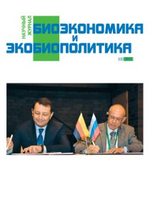Microbial Resources, Data and Services of VKM Offered for Biotechnology
Авторы: Ступарь О. С., Кочкина Г. А., Василенко А. Н., Евтушенко Л. И.
Рубрика: Тезисы
Опубликовано в Биоэкономика и экобиополитика №1 (1) декабрь 2015 г.
Дата публикации: 15.01.2016
Статья просмотрена: 3 раза
Библиографическое описание:
Ступарь, О. С. Microbial Resources, Data and Services of VKM Offered for Biotechnology / О. С. Ступарь, Г. А. Кочкина, А. Н. Василенко, Л. И. Евтушенко. — Текст : непосредственный // Биоэкономика и экобиополитика. — 2015. — № 1 (1). — URL: https://moluch.ru/th/7/archive/20/660/ (дата обращения: 25.04.2025).
The expanding network of culture collections seeks to provide a widening spectrum of biomaterials and associated information to meet the growing demands of modern biotechnology.
The All-Russian Collection of Microoganisms (VKM) located at the G. K. Skryabin Institute of Biochemistry and Physiology of Microorganisms (Pushchino, Moscow region) is one of the largest Russian collections in the area of non-medical microbiology. It hosts nearly 20,000 cultures of bacteria (including actinobacteria), archaea, filamentous fungi and yeasts isolated from various environments of different geography, and contains many strains of biotechnological interest. The VKM sub-collection of fungi from low-temperature habitats is the largest one among those “coming in from the cold” and currently includes nearly 750 strains (more than 140 species). Screening conducted among fungi and bacteria from lowtemperature habitats revealed several strains of potential medical interest. VKM also offers services such as supply and deposition of cultures, including deposition for patent purposes according the requirements of the Budapest Treaty and deposition of newly described taxa. Scientific services mostly focus on identification, sharing expertise as well as training. Recent activities of VKM emphasize the development of information resources at VKM (including the DataBase “Microbial Application Properties”) as well as integration of the currently dispersed microbial collections in Russia into a common virtual network.







